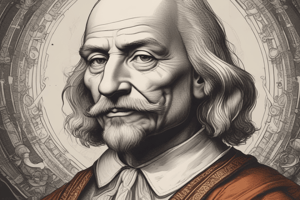Podcast
Questions and Answers
What is the fundamental belief of Thomas Hobbes regarding human nature?
What is the fundamental belief of Thomas Hobbes regarding human nature?
- Humans naturally seek to live in harmony.
- Humans desire to dominate and control others. (correct)
- Humans are inherently altruistic and cooperative.
- Humans are motivated solely by survival needs.
How did Hobbes view the role of government in society?
How did Hobbes view the role of government in society?
- As an unnecessary imposition on natural human interactions.
- As a weak force that allows individuals to express their nature.
- As a necessary fearsome power to control self-interested behavior. (correct)
- As a collective decision-making body free from punishment.
What was Jean-Jacques Rousseau's view on human nature?
What was Jean-Jacques Rousseau's view on human nature?
- Humans possess natural compassion and kindness. (correct)
- Humans are violent and aggressive by nature.
- Humans thrive in hierarchical structures.
- Humans are primarily motivated by self-interest.
What does Hobbes mean by 'the state of nature'?
What does Hobbes mean by 'the state of nature'?
What role does fear play in Hobbes' understanding of society?
What role does fear play in Hobbes' understanding of society?
According to Rousseau, what causes significant inequality among humans?
According to Rousseau, what causes significant inequality among humans?
What does the pacification process refer to in Hobbes' theory?
What does the pacification process refer to in Hobbes' theory?
What aspect of human behavior does neuroscientist Jorge Moll associate with the reward system?
What aspect of human behavior does neuroscientist Jorge Moll associate with the reward system?
According to Hobbes, what influence does a strong government have on violence?
According to Hobbes, what influence does a strong government have on violence?
What is one of the critiques psychologists have regarding Hobbes and Rousseau's theories?
What is one of the critiques psychologists have regarding Hobbes and Rousseau's theories?
What is the primary motive according to Thich Nhat Hahn’s view of human nature?
What is the primary motive according to Thich Nhat Hahn’s view of human nature?
The Dalai Lama emphasizes what central aspect of human nature?
The Dalai Lama emphasizes what central aspect of human nature?
What is the identified benefit of meditation according to the content?
What is the identified benefit of meditation according to the content?
What do Ryan, Kasser, and Sheldon focus their research on?
What do Ryan, Kasser, and Sheldon focus their research on?
What does Thich Nhat Hahn associate with chronic dissatisfaction?
What does Thich Nhat Hahn associate with chronic dissatisfaction?
What concept represents potentiality in Thich Nhat Hahn's view of human nature?
What concept represents potentiality in Thich Nhat Hahn's view of human nature?
Flashcards are hidden until you start studying
Study Notes
Key Topics of Western Philosophy
Thomas Hobbes (1588-1679)
- Explored the concept of self-governance aligned with human nature.
- Identified human nature as a struggle for dominance; individuals are inherently selfish and seek power, control, and resources.
- Noted that humans would engage in deceitful means to achieve their goals.
- Described the "state of nature" as "nasty, brutish, and short."
- Advocated for a strong government as necessary to instill fear of punishment, ensuring societal order.
- Originated the idea of the pacification process, where individuals regulate impulses due to governmental authority.
- Observed that consolidation of small communities into larger entities promotes better trading and living conditions.
Response to Diverse Findings in Human Nature
- Developmental psychology reveals spontaneous altruism, indicating a more prosocial human nature.
- Neuroscience research by Jorge Moll found that the reward system activates during charitable actions, demonstrating an inclination toward generosity.
- Primatology studies of chimpanzees and bonobos suggest underlying prosocial behaviors in humans.
Jean-Jacques Rousseau (1712-1778)
- Contrasted Hobbes by viewing human nature as compassionate and kind, especially in a hunter-gatherer context.
- Argued that the development of wealth inequality leads to violence and societal conflict.
- Proposed that proper governance should minimize unnatural inequalities among citizens.
Critiques of Hobbes and Rousseau
- Psychological critiques highlight the dangers of generalizing human behavior from limited evidence.
- Questions arose regarding individual differences and the complex processes shaping human personality.
- Critiques emphasized the need to consider non-essentialist views, where human nature is not predetermined.
Eastern Philosophy
The Dalai Lama (1935-)
- Promotes human gentleness and the pleasure in benefiting others.
- Observes that infants’ dependence on adults highlights a unique aspect of human nature.
- Research (Ryan, Kasser, Sheldon) found that individuals experience the most positive emotions when pursuing altruistic goals.
- Emphasizes meditation as a means to uncover insights about happiness, reinforcing altruistic behaviors.
Thich Nhat Hanh (1926-2022)
- Prohibited chronic dissatisfaction, linked to mental habits affecting well-being.
- Advocated for mindfulness to gain control over thoughts and perceptions, moving away from past and future concerns.
- Proposed a dual aspect of human nature:
- One perspective views the primary motive as seeking contentment free from worry.
- The second perspective suggests individuals possess "all the seeds" of potentiality, empowering them to achieve various human experiences.
Studying That Suits You
Use AI to generate personalized quizzes and flashcards to suit your learning preferences.





